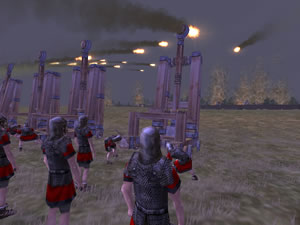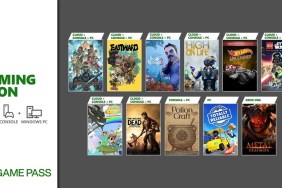Rome around the world.
The People’s Front of Judea
once observed, “Apart from medicine, education, wine, public order, irrigation,
roads, a fresh water system and public health, what have the Romans ever given
us? Nothing!” Well, two thousand years later, those lazy Romans are finally going
to give us something new.
Rome: Total War is the latest in the popular military strategy series and threatens to bring the spectacle of war into your very own home. First, though, it brought me to an Activision event, where I spent some time playing the previously unplayable single-player campaign. And if that was any indication of the final product, this might just be the best thing Rome has given us since the Coliseum.
You
fight for the glory of Rome as
the Julians, a minor noble family. Although
you begin as the founder of the family, Gaius Julius, many years will pass through
the course of a game, and you will have children and grandchildren who become
the new generals and governors of your growing dynasty. The Senate may set you
upon particular enemies, or you may simply decide to expand your family’s fame
and fortune, but either way you must march your deadly Roman Legions across Italy,
Europe, and even Africa.
And when I say legions, I mean it. The hallmark of the Total
War series is large scale conflict with hundreds of soldiers, and with
its impressive new game engine, Rome doesn’t disappoint. Over
10,000 motion-captured soldiers, all rendered, can fight on a single battlefield.
The road thunders to the footsteps of your vast marching armies, and your
enemies will cower behind the walls of their cities, fearing to face your overwhelming
forces. Yikes.
Of course, you don’t always enjoy such luxury – the enemies of Rome, such as the Gaulish hordes and the Greek armies, can field gigantic forces of their own. You will have to contend with their strange weapons and foreign tactics if you wish to advance the might of the Senate and State.
Controlling 5,000 soldiers may sound like a daunting task, but the prologue is
an extensive tutorial that walks you through several easy battles. All the
basic gameplay mechanics are covered, both in combat and in the overland map.
By the end of the prologue, while no battle hardened Legatus, I was certainly
no longer a lowly Tirones, and could command my men with reasonable efficiency.
The point and click system is fairly straightforward; any experienced real-time-strategy
gamer will find it fairly intuitive. Instead of selecting single soldiers,
you select their whole unit, ranging from about 10 to 40 men. Then march or
charge them into combat with the right click button. That’s assuming they listen
to you, because morale plays an important part in Rome:
Total War. Soldiers
on either side can panic and run, and intimidating the enemy is an excellent
way to turn a close battle into a rout.
 Huge
Huge
walled cities are often the center of the conflict, so you’ll need siege engines,
battering rams, and scaling ladders if you want to pry the enemy out of their
stronghold. Be careful if it’s a city you wish to take for yourself, though,
because you’ll have to repair and rebuild whatever you destroyed. Of course,
you can always just raze the city and sell the population into slavery. Where
do you think the Game Revolution staff comes from?
If you’re not trying to take or defend a city, the terrain of your battlefield
will depend on where your armies meet on the huge overland map. Even your improvements,
like roads or improved agriculture, will be reflected in the terrain.
But it’s the conflict in Rome: Total War that’s most impressive.
The size of your armies is simply staggering, and with the right graphics card,
your soldiers should look as good as they fight. Arrows fly, spears clash on
shields, and a well-placed cavalry charge can break the enemy lines, scattering
soldiers like bowling pins and trampling them under horses’ hooves.
In fact, the graphics are so good, they’re the star of a television program. The new History Channel series Decisive
Battles uses this very same engine to recreate historical conflicts in impressive detail. Talk about tech crossover!
I was nearly as impressed by the sound in the beta build. The orators in the Senate convince and inspire better than most U.S. pundits, and your battle commanders can goad the troops with speeches worthy of Gladiator.
Even when you’re not on the battlefield, there’s more game to be found. As you conquer territories and cities, you will need to manage your growing family estates, wealth, resources, offspring and perhaps even an empire. The success of the Roman Empire goes far beyond just the might of its armies.
 Managing
Managing
the cities and regions under your control is a bit like playing Civilization.
Improvements such as sewers or a sheltered port can help your city to grow and
prosper, just as building roads between them will help you move your armies
around more efficiently. You can also recruit and train troops in your cities,
which is necessary, because whatever army you bring to a battlefield is all you
have. You can’t just
chop more wood to have more centurions emerge from the “centurion hut.”
As you explore and uncover the overland map, you will find both friends and enemies abroad. Foreign kingdoms can be a source of trade and not just the target of conquest. Diplomacy is sometimes more effective than the sword.
Of course, you don’t always need to look far abroad for enemies, and as your Julian family grows in power, you’ll find yourself having to deal with the petty politics if the SQPR. Power always begets jealousy, but with the right friends on the senate, you may even aspire to become Emperor of the Republic.
If you haven’t gathered, I really enjoyed playing the beta build of Rome:
Total War, and you can even try
out a demo yourself. It looks to have everything you could want in an RTS
set on a grandiose backdrop the likes of which PC gamers have never seen. Sharpen
your gladius and get ready to conquer the uncivilized hordes this Fall.







